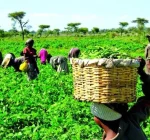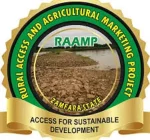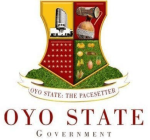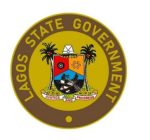Ekiti, others to participate in $600m RAAMP’s scale-up project
- 40 Views
- Agribusiness Africa
- October 20, 2025
- News & Analysis
The Ekiti State Government has signed a Subsidiary Loan Agreement (SLA) to participate in the scale-up phase of the Rural Access and Agricultural Marketing Project (RAAMP) — a $600 million initiative aimed at expanding rural road infrastructure to enhance food production and market access across the state.
Speaking during the 9th Implementation Support Mission of the project, Engr. Aminu Bodinga Mohammed, National Coordinator of RAAMP, announced that all 36 states and the FCT are expected to join the scale-up phase once they meet the enlistment requirements.
Mohammed revealed that Ekiti State is among the few states — alongside Akwa Ibom, Bauchi, and Sokoto — that have successfully operationalized key road sector reforms, including the establishment of the Rural Access Roads Agency (RARA) and the State Roads Fund (SRF). These, he said, are critical components for sustaining rural road infrastructure and improving agricultural logistics.
“I am happy to inform you that another $500 million has been secured from the World Bank for the Scale-Up. We have put in place machinery to ensure sustainability through the State Roads Fund and the Rural Access Road Authority,” Mohammed stated.
The national coordinator explained that the scale-up is being co-financed by the World Bank, the French Development Bank (AFD), and participating states through the Federal Government of Nigeria, with the target of completing 801.96km of rural roads by April 2026. So far, 273.33km have been completed, while 528.63km are in progress.
He commended Governor Biodun Oyebanji for his administration’s commitment and prompt payment of counterpart funds, ranking Ekiti second among six participating states — including Niger, Osun, Ebonyi, Gombe, and Kaduna — in financial performance.
In his remarks, Rakesh Tripathi, the World Bank Task Team Lead, reaffirmed the Bank’s support for the $600 million scale-up programme, commending states for their efforts despite weather-related disruptions. He urged all participants to ensure that at least 90% of previously awarded roads are completed within the next six months to align contract performance with civil work execution.
Responding to the inclusion of Ekiti in the scale-up, Sunday Adunmo, the State Project Coordinator, described the development as a “game changer” for rural communities, enabling greater market access and economic opportunities through improved rural roads.
Adunmo applauded Governor Oyebanji for his consistent support and funding, noting that Ekiti RAAMP had already delivered 50km of asphalted roads out of the initial 132km awarded when the project began. He congratulated the governor on his third anniversary in office, describing his impact as transformative and farmer-focused.
Source: Tribune Online
Expert Review for Agri-Food Stakeholders
The inclusion of Ekiti State in the RAAMP scale-up represents a vital stride in integrating infrastructure-led agricultural transformation into Nigeria’s rural development framework. For agribusiness stakeholders, this project is more than road construction — it’s about unlocking rural economies, reducing transaction costs, and strengthening value chain connectivity from production to market.
- Rural Infrastructure as a Growth Enabler
Rural roads are the backbone of an efficient food system. Improved access enables farmers to transport produce swiftly, curbs post-harvest losses, and links farming communities with processing hubs and urban markets. Ekiti’s participation positions the state for improved farm-to-market efficiency, which directly influences profitability and market stability. - Institutional Framework and Sustainability
The establishment of the Rural Access Roads Agency (RARA) and State Roads Fund (SRF) sets Ekiti apart as a model for institutional sustainability. These structures demonstrate governance maturity and ensure that road infrastructure development is not donor-dependent. If effectively managed, they could attract private-sector investments and logistics innovations that enhance agricultural competitiveness. - Strategic Alignment with National Agri-Policies
The RAAMP scale-up aligns with Nigeria’s broader Food Security and Agricultural Transformation Agenda, which prioritizes rural access as a catalyst for agribusiness growth. For development partners and investors, Ekiti’s readiness signals a conducive environment for impact-oriented financing, particularly in rural infrastructure, aggregation, and agro-processing. - Implementation Challenges and Opportunities
While the progress is commendable, sustaining momentum requires effective coordination, contractor accountability, and transparent project monitoring. A participatory model that includes local communities and agribusiness actors will be key to ensuring long-term success and ownership beyond the project cycle.
Conclusion
Ekiti’s enlistment in the RAAMP Scale-Up Phase underscores a clear shift toward evidence-based, infrastructure-driven agricultural development. It presents an opportunity to bridge rural-urban divides, stimulate agribusiness investment, and enhance the competitiveness of Nigeria’s food system. If implementation stays on course, Ekiti could become a regional benchmark for how integrated road networks can drive agricultural prosperity and rural transformation.
- #AFD
- #AgribusinessAfrica
- #AgriculturalLogistics
- #AgriEconomy
- #AgriFinancing
- #AgriGovernance
- #AgriGrowth
- #AgriInfrastructure
- #AgriInnovation
- #AgriInvestment
- #AgriLeadership
- #AgriPolicy
- #AgriReform
- #AgriResilience
- #AgriTransformation
- #EkitiAgriculture
- #FarmInfrastructure
- #FarmToMarket
- #GreenAfrica
- #NigeriaAgriculture
- #OyebanjiAdministration
- #PublicPrivatePartnership
- #RAAMP
- #RARA
- #RoadConnectivity
- #RuralAccess
- #RuralDevelopment
- #SRF
- #SustainableFarming
- #WorldBankNigeria
- FoodSecurity











